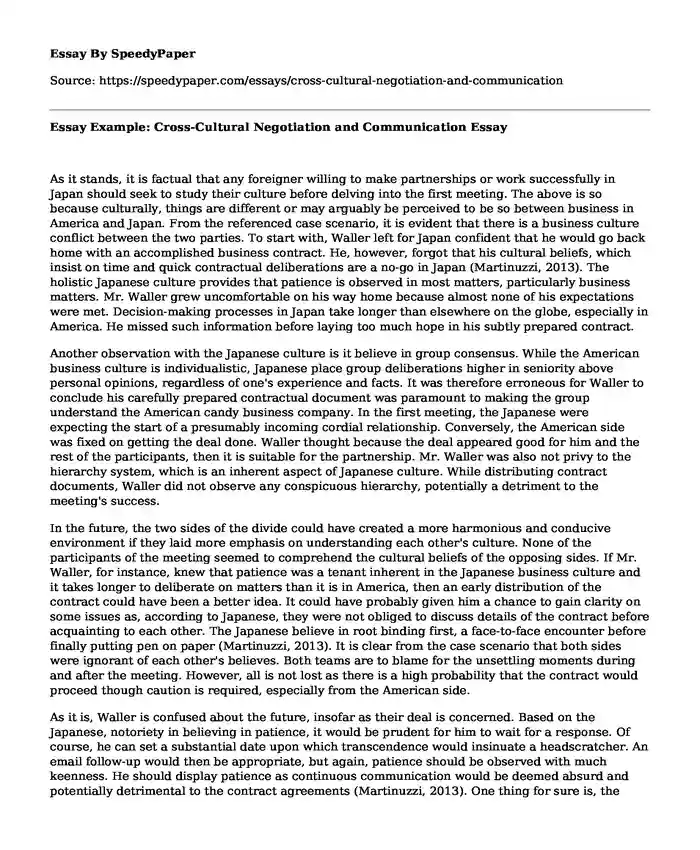
| Essay type: | Reflective essays |
| Categories: | Multiculturalism Asia Intercultural communication Interpersonal communication |
| Pages: | 3 |
| Wordcount: | 672 words |
As it stands, it is factual that any foreigner willing to make partnerships or work successfully in Japan should seek to study their culture before delving into the first meeting. The above is so because culturally, things are different or may arguably be perceived to be so between business in America and Japan. From the referenced case scenario, it is evident that there is a business culture conflict between the two parties. To start with, Waller left for Japan confident that he would go back home with an accomplished business contract. He, however, forgot that his cultural beliefs, which insist on time and quick contractual deliberations are a no-go in Japan (Martinuzzi, 2013). The holistic Japanese culture provides that patience is observed in most matters, particularly business matters. Mr. Waller grew uncomfortable on his way home because almost none of his expectations were met. Decision-making processes in Japan take longer than elsewhere on the globe, especially in America. He missed such information before laying too much hope in his subtly prepared contract.
Another observation with the Japanese culture is it believe in group consensus. While the American business culture is individualistic, Japanese place group deliberations higher in seniority above personal opinions, regardless of one's experience and facts. It was therefore erroneous for Waller to conclude his carefully prepared contractual document was paramount to making the group understand the American candy business company. In the first meeting, the Japanese were expecting the start of a presumably incoming cordial relationship. Conversely, the American side was fixed on getting the deal done. Waller thought because the deal appeared good for him and the rest of the participants, then it is suitable for the partnership. Mr. Waller was also not privy to the hierarchy system, which is an inherent aspect of Japanese culture. While distributing contract documents, Waller did not observe any conspicuous hierarchy, potentially a detriment to the meeting's success.
In the future, the two sides of the divide could have created a more harmonious and conducive environment if they laid more emphasis on understanding each other's culture. None of the participants of the meeting seemed to comprehend the cultural beliefs of the opposing sides. If Mr. Waller, for instance, knew that patience was a tenant inherent in the Japanese business culture and it takes longer to deliberate on matters than it is in America, then an early distribution of the contract could have been a better idea. It could have probably given him a chance to gain clarity on some issues as, according to Japanese, they were not obliged to discuss details of the contract before acquainting to each other. The Japanese believe in root binding first, a face-to-face encounter before finally putting pen on paper (Martinuzzi, 2013). It is clear from the case scenario that both sides were ignorant of each other's believes. Both teams are to blame for the unsettling moments during and after the meeting. However, all is not lost as there is a high probability that the contract would proceed though caution is required, especially from the American side.
As it is, Waller is confused about the future, insofar as their deal is concerned. Based on the Japanese, notoriety in believing in patience, it would be prudent for him to wait for a response. Of course, he can set a substantial date upon which transcendence would insinuate a headscratcher. An email follow-up would then be appropriate, but again, patience should be observed with much keenness. He should display patience as continuous communication would be deemed absurd and potentially detrimental to the contract agreements (Martinuzzi, 2013). One thing for sure is, the Japanese organization would look at the contract in detail. It will be passed through the various hierarchies in the organization before a final deliberation is taken, with the entire group in mind. Patience for Waller is paramount and tantamount to acceptable etiquette as it stands.
Reference List
Martinuzzi, B. (2013, August 5). Doing business in Japan: 10 etiquette rules you should know. American Express. Viewed 15 June 2020. https://www.americanexpress.com/en-us/business/trends-and-insights/articles/doing-business-in-japan-10-etiquette-rules-you-should-know/
Cite this page
Essay Example: Cross-Cultural Negotiation and Communication. (2023, Aug 31). Retrieved from https://speedypaper.com/essays/cross-cultural-negotiation-and-communication
Request Removal
If you are the original author of this essay and no longer wish to have it published on the SpeedyPaper website, please click below to request its removal:
- History Essay Example: Native American Conflict with European Settlers
- Annotated Bibliography Example - Effects of Globalism on Doha/Qatar Today
- Free Essay. Historical Events Impacting the Mexican-American Relations
- Free Essay on Community Development Process
- Organizational Behavior and Workplace Diversity. Free Essay
- Essay Sample on How Mcleod Should Handle Dilemma
- Free Essay: Verbal and Nonverbal Communication
Popular categories




